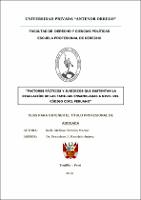Mostrar el registro sencillo del ítem
Factores fácticos y jurídicos que sustentan la regulación de las familias ensambladas a nivel del Código Civil Peruano.
| dc.contributor.advisor | Mauricio Juárez, Francisco Javier | |
| dc.contributor.author | Paredes Maraví, Melissa Katherine | |
| dc.creator | Paredes Maraví, Melissa Katherine | |
| dc.date.accessioned | 2019-05-15T14:44:14Z | |
| dc.date.available | 2019-05-15T14:44:14Z | |
| dc.date.issued | 2019 | |
| dc.identifier.uri | https://hdl.handle.net/20.500.12759/4802 | |
| dc.description.abstract | En la presente Tesis denominada “Factores fácticos y jurídicos que sustentan la regulación de las familias ensambladas a nivel del Código Civil Peruano”, nos abocamos a la determinación de los elementos por los cuales se justifica la necesidad de regular las familias ensambladas en el ordenamiento jurídico de nuestro país. En este sentido, la formulación del Problema fue el siguiente: ¿CUÁLES SON LOS FUNDAMENTOS FÁCTICOS Y JURÍDICOS QUE PERMITEN JUSTIFICAR LA NECESIDAD DE NORMATIVIZAR LA INSTITUCIÓN DE LAS FAMILIAS ENSAMBLADAS A NIVEL DEL ORDENAMIENTO CIVIL PERUANO?, frente a lo cual se planteó en calidad de hipótesis la siguiente: “Los fundamentos fácticos y jurídicos que permiten justificar la necesidad de normativizar la institución de las familias ensambladas a nivel del ordenamiento civil peruano son: el reconocimiento del derecho de igualdad de sus miembros en cuestiones personales y patrimoniales, la autonomía jurídica en el Derecho de familia y por consiguiente la protección plena de este nuevo modelo familiar en el Perú”. En aplicación de los diversos métodos lógicos y jurídicos, entre ellos los métodos de interpretación, deductivo y sintético, se logró concluir que existen fundamentos de carácter fáctico y jurídico en el sentido de normativizar la figura de las familias ensambladas en el ordenamiento nacional, los cuales se expresan en el reconocimiento del derecho de igualdad de sus miembros en cuestiones personales y patrimoniales, la autonomía jurídica en el Derecho de familia y la protección plena de este nuevo modelo familiar en el Perú. Asímismo se concluye que se hace necesario proponer una fórmula legislativa que regule esta figura de las familias ensambladas, dado que el Derecho está dirigido precisamente a regular una figura que acontecen en ella, dado que el legislador no puede desconocer la dinámica social de la evolución familiar, frente a lo cual debe regular esta situación en el ordenamiento civil. | es_PE |
| dc.description.abstract | In this thesis entitled “Factual and legal factors that support the regulation of families assembled at the level of the Peruvian Civil Code“, we focus on determining the elements that justify the need to regulate families assembled in the legal system of our country. In this sense, the formulation of our Problem was the following: WHAT ARE THE FACTUAL AND LEGAL BASIS THAT ALLOWS TO JUSTIFY THE NEED TO NORMATIVIZE THE INSTITUTION OF THE FAMILIES ASSEMBLED AT THE LEVEL OF THE PERUVIAN CIVIL SYSTEM?, which we consider in quality of hypothesis the following: “The factual and legal foundations that allow to justify the need to standardize the institution of families assembled at the level of the Peruvian civil order are: the recognition of the right of equality of its members in personal and property matters, legal autonomy in family law and therefore the full protection of this new family model in Peru“. In application of the various logical and legal methods, including methods of interpretation, deductive and synthetic, it was possible to conclude that there are foundations of a factual and legal nature in the sense of standardizing the figure of families assembled in the national order, which they are expressed in the recognition of the right of equality of its members in personal and patrimonial matters, the legal autonomy in Family Law and the full protection of this new family model in Peru. It is also concluded that it is necessary to propose a legislative formula that regulates this figure of assembled families, given that the law is aimed precisely at regulating a figure that occurs in it, given that the legislator can not ignore the social dynamics of family evolution , against which it must regulate this situation in the civil order. | en_US |
| dc.description.uri | Tesis | es_PE |
| dc.format | application/pdf | es_PE |
| dc.language.iso | spa | es_PE |
| dc.publisher | Universidad Privada Antenor Orrego | es_PE |
| dc.relation.ispartofseries | T_DERE_458 | |
| dc.rights | info:eu-repo/semantics/openAccess | es_PE |
| dc.rights.uri | https://creativecommons.org/licenses/by/4.0/ | es_PE |
| dc.source | Universidad Privada Antenor Orrego | es_PE |
| dc.source | Repositorio Institucional - UPAO | es_PE |
| dc.subject | Familias ensambladas | es_PE |
| dc.subject | Derecho a la igualdad | es_PE |
| dc.subject | Autonomía jurídica | es_PE |
| dc.title | Factores fácticos y jurídicos que sustentan la regulación de las familias ensambladas a nivel del Código Civil Peruano. | es_PE |
| dc.type | info:eu-repo/semantics/bachelorThesis | es_PE |
| thesis.degree.level | Título Profesional | es_PE |
| thesis.degree.grantor | Universidad Privada Antenor Orrego. Facultad de Derecho y Ciencias Politicas | es_PE |
| thesis.degree.name | Abogado | es_PE |
| thesis.degree.discipline | Derecho | es_PE |
| dc.subject.ocde | https://purl.org/pe-repo/ocde/ford#5.05.00 | es_PE |
| renati.type | https://purl.org/pe-repo/renati/type#tesis | es_PE |
| renati.level | https://purl.org/pe-repo/renati/level#tituloProfesional | es_PE |
| renati.discipline | 421016 | es_PE |
| dc.publisher.country | PE | es_PE |
Ficheros en el ítem
Este ítem aparece en la(s) siguiente(s) colección(es)
-
Derecho [477]


